THE COLT PYTHON
A HISTORY OF LEGENDARY AMERICAN EXCELLENCE
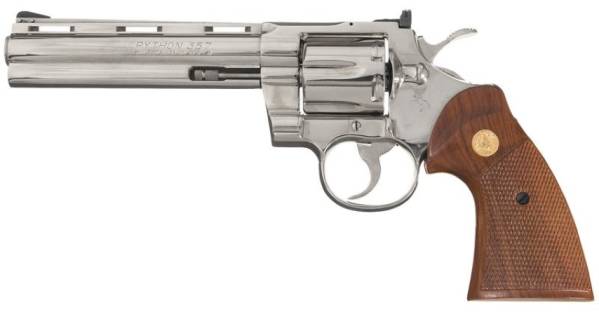
THE COLT PYTHON
"I" FRAME
In the history of modern double action American handguns, the Colt Python revolver stands above all others.
It was born in the mid-1950's in a post-war era in which quality was already starting to fall from the heights that American gun making had attained in the 1930's and 40's.
Going against the grain of fast, mass production firearms made of stamped and fabricated parts and "Space Age" plastics and aluminum, the Python was intended to be the finest revolver ever made in America, and it met that goal.
At the time, the finest double action revolvers made were the Colt Officer's Model Match target revolver and the Smith & Wesson Model 27 Magnum. Each was the top quality revolver made by the respective companies.
In the mid-1950's the Colt Officer's Model Match was the latest in a long series of Colt Officer's Model target revolvers. These were intended to be the most accurate and high quality double action revolver made and in the day when the double action revolver was King of the pistol matches, the Colt held all the records.
Colt's top West Coast salesman at that time was Bill Henry. In 1953 he was convinced that Colt should make a new "Super target revolver" that would outclass anything ever conceived before in both quality and accuracy.
For years, top shooters had been modifying the Officer's Model revolvers with custom vented ribs on the barrel to add more forward weight to the barrel, and having custom altered hammers that were longer and wider for easier cocking. Many of these customized guns were altered by top custom shops like King's of California, who specialized in target pistol alterations.
Henry thought that if Colt would make a target revolver with all the custom features on a factory gun, it would sell in good numbers. An added selling point would be that the pistol would be the most accurate double action revolver ever made in keeping with it's intended audience, target shooters.
Henry convinced Colt management that he could sell this new revolver, even though it would cost significantly more then any other revolver and would demand far more of the companies resources in time and higher skilled personnel than any other pistol ever made.
Colt assigned the development of this new revolver to the famed Colt Pattern Room, where Colt Master gunsmith Adalbert "Al" Gunther built the first prototype using a Colt Officer's Model frame and a Targetmaster rear sight of the type that had been used on the Colt Officer's Model Special of 1949 to 1952.
The prototype had a 4 5/8" heavy ribbed and under-lugged barrel and Colt's new Target hammer and grips.
The gunsmiths thought the prototype was too muzzle heavy, weighing a then unheard of 60 ounces. Gunther and his crew decided to hollow out the solid under-lug and cut vents in the heavy top rib.
With the vents and hollow under-lug they decided the gun felt "right".
The Python barrel was so "right" in feel and appearance, virtually every revolver designed since has a barrel that looks as much like the Python barrel as the makers dare.
In the post-war days, the .357 Magnum was becoming more and more popular. Colt had made a marketing mistake in deciding that the gun buyer would buy the same .38 Special revolver he'd bought before the war, and was seeing sales drop. They decided that the new "super revolver" should be chambered in .357 Magnum instead of .38 Special, figuring that since both cartridges could be fired in the same gun, this would make the gun more popular with a wider number of customers.
Colt Master gunsmith Al DeJohn built the first pre-production model, serial number One. By this time, the new gun had Colt's new "I" frame action in which the firing pin was mounted inside the frame instead of on the hammer and the barrel was six inches.
The rear sight was now the new Colt Accro adjustable version that was to be used on virtually all adjustable sighted Colt pistols and revolvers from then on.
Needing a name for the new revolver, Colt had an internal contest to name it, and Colt legend has it that the name "Python" was submitted by Colt Vice President Phillip Schwartz.
Colt had started the use of snake named pistols in 1950 with the aluminum framed version of the Colt Detective Special, the Cobra. Since the python is a bigger snake than a cobra, and the Python was a bigger gun, the name was well suited.
As introduced in 1955 the Python was available with a six inch barrel with three vents on the rib, a hollow under-lug, and Colt's fully checkered Target grips. The rear sight was the early version of the Colt Accro rear sight, and the finish was a brilliant, mirror-like blue unlike anything seen before,
The Python bluing was the first time a super polished blued finish had ever been used on a production gun and it became known as Colt Royal Blue. Inside the Colt factory, it was known as "the Python blue".
The only real difference between the Python's deep mirror blue and normal guns more satin blue was the amount of polishing given to the Python.
It was said that while competitors guns were in trucks being shipped to the distributors, the Python was still in the factory being polished.
Colt had always been known for their fine blue jobs, and the reason why was that Colt was running a metal polishers school for Colt employees.
A new polisher was sent to school where master polishers taught how to polish metal to a perfect finish with no rounded off edges or ripples in the flats. After training, the new polisher was started out on the lower cost guns like the Official Police, with one of the master polishers literally looking over his shoulder and correcting his technique.
Colt made their own special polishing wheels from large wooden disks covered with walrus hide leather.
These wheels were used for only one grit of polish, and as the gun was polished, a different wheel was used for the next finer grit.
The Python polish went farther down in grit until the final polish was done with media the consistency of flour.
Since even a slight slip would ruin the Python's finish, only master polishers with many years of experience were ever allowed to work on the Python.
COLT MADE WALRUS HIDE LEATHER COVERED WOODEN POLISHING WHEELS
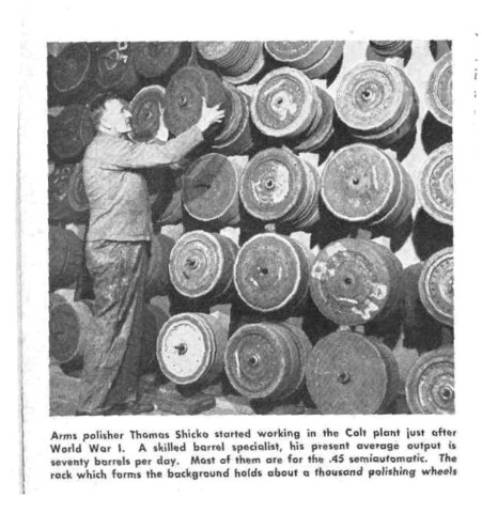
A COLT MASTER POLISHER AT THE WHEEL
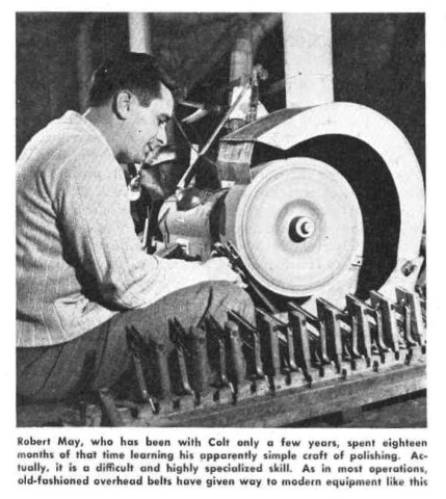
The old Colt action design was a product of the late 1890's. It was complex, and required that the action be literally hand fitted. The action was built using over-sized forged parts in which a fitter would assemble the action by filing, stoning, and even bending parts to get a working revolver.
In line with the desire to make the Python the finest revolver ever made, Colt had the action even further polished and tuned to give the best possible trigger pull.
So concerned was Colt that the Python would be the best ever made, for the first two years only Al DeJohn and one other man built every Python produced by Colt.
After they burned out from the demand for new Pythons, Colt put the Python into standard production using their best people.
Colt was almost immediately flooded with demands that they offer the Python in a 4" barrel for police use, and the first 4" barreled Pythons were advertised as the Colt New Police Python, although that name was never stamped on the gun.
Soon, Colt began to offer the Python with a 2 1/2" barrel. Colt legend says that the 2 1/2" Python started off as a joke by two Colt managers who wanted to play a practical joke on a senior manager.
They had a Python shortened to 2 1/2" and showed it to the intended victim. At the time, the idea of a short barreled revolver with the powerful, heavy muzzle blast of the .357 Magnum was considered to be ridiculous.
Instead of laughing, the manager handled the snubby Python and liked the feel so well, he ordered it into production.
In time the Python would also be offered in an 8" barrel and in a short run of extremely rare 3" barreled versions.
Demands were made for other finishes beside Royal Blue, so over the years Colt offered the Python in Bright Nickel, satin electroless nickel known as "Royal Coltguard", and in the early 1980's in satin stainless steel and in bright mirror polished stainless steel, variously known as Bright Polish or Ultimate Polish.
The Python was only sold in two calibers: the standard .357 Magnum and the Colt Python Target in .38 Special with an 8" barrel.
Colt did make experimental Pythons in other calibers, including .22LR, .22 Magnum, a .256, and in .41 Magnum.
None of these guns were ever made in more than a very few experimental examples, and none were sold as production guns.
From time to time Pythons in calibers other than .357 and .38 turn up, but these are invariably not factory guns but conversions done by gunsmiths.
In the mid-1980's Colt issued a catalog featuring a pair or .22LR Pythons on the cover.
Colt announced that they'd intended to produce .22LR Pythons but after the catalog was already printed they'd changed their minds and no production .22 models were made.
One knowledgeable collector says that Colt definitely made prototype Pythons in .22LR and in .22 Magnum, but thinks that they were not functioning revolvers.
One of the most discussed Pythons are the .41 Magnum guns.
Colt made up three or four prototype .41 Magnum Pythons on the request of a big firearms distributor who wanted to offer something different.
Colt had second thoughts and decided the frame and cylinder simply weren't big enough to provide the strength needed for the .41 Magnum, so they recalled the guns and canceled the idea.
However, several custom gunsmiths decided to offer conversions of .357 Pythons to .41 Magnum.
Some of these guns were very well done conversions right down to factory style and quality roll marks on the barrel. Others are very crudely done and are easy to identify as not factory quality.
Even though Colt adamantly states that no factory production .41 Magnum Pythons were ever made or sold, people still insist that their .41 Magnum Python is a real factory gun.
A telling point is, if a Colt Historical Archive search is done on the serial number, these invariably show as having left the factory as .357 Magnum Pythons.
Production of the Python continued as a production line gun until the late 1990's.
With the Colt company in financial difficulties and having lost some of their best craftsmen, Colt moved production into the Colt Custom Shop in 1997 and made it a custom order only revolver. To highlight this move, the Python had the name "Elite" added to the barrel and it became the Colt Python Elite.
The Elite was exactly the same gun as the standard Python with only the barrel stamp being different.
Production of the Python finally ended in 2003-04.
The last manufacturer's list price for the Python was $1,150.
The last Python made was an ornate, heavily engraved and inlaid 6" gun made in 2005 to commemorate the 50th anniversary of it's introduction in 1955.
With that one-of-a-kind show model, the Python passed into history.
PYTHON 2 1/2 INCH
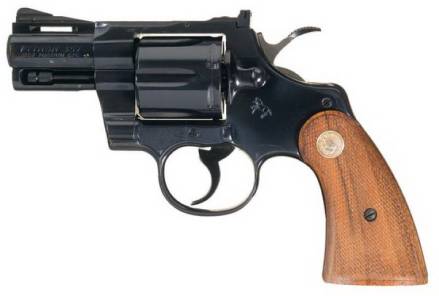
PYTHON 3 INCH, LIMITED FACTORY PRODUCTION
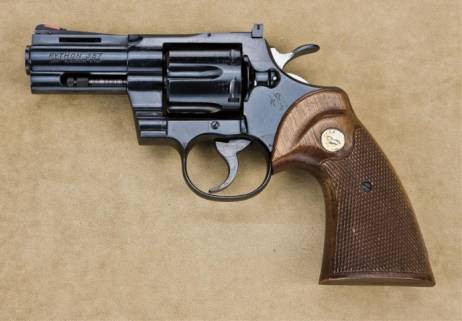
PYTHON 4 INCH
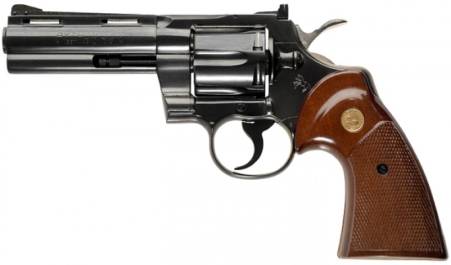
PYTHON 6 INCH
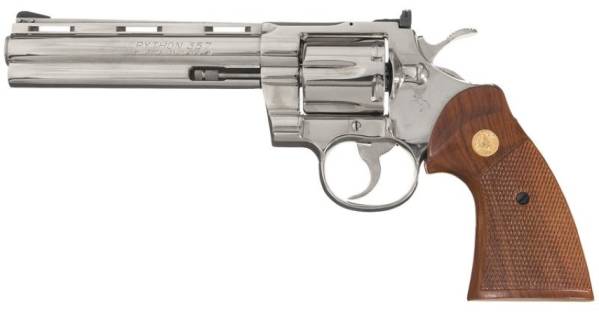
PYTHON 8 INCH
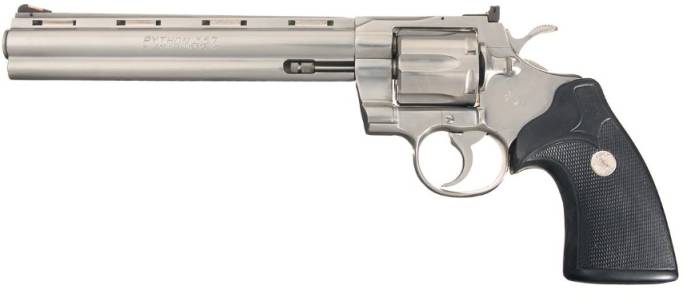
PYTHON ELITE
Only the barrel stamp and grips were different.
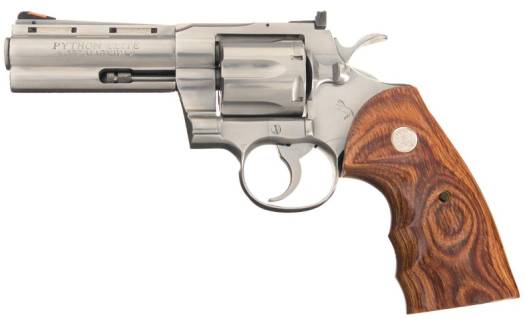
ACCURACY
A major selling point of the Python, right from the original concept as a target revolver, was that the Python was the most accurate double action revolver ever made.
In fact, the Python met the hype with few revolvers able to match it for pure accuracy.
There are a number of reasons for the Python's deserved reputation.
First is the old Colt medium frame action. Designed in the 1890's the Colt action was unique in that the cylinder was locked tightly in perfect alignment with the bore at the moment of ignition.
This was known as the Colt "Bank Vault Lock-up".
In this action, the hand that rotates the cylinder pushes the cylinder into a tight lock-up and holds it there under pressure. The harder the trigger is pulled (within reason) the tighter the cylinder is locked in place.
The advantage of this design is that since the chamber is perfectly aligned with the bore, the bullet passes into the barrel perfectly centered. Since it is centered, the bullet doesn't hit the forcing cone off-center and the bullet is not deformed. A bullet that isn't deformed in the bore will be more accurate.
The down side to the Colt action is that it cost a lot more to build due to the amount of hand labor by Master fitters needed to assemble and adjust it.
A second reason for the legendary Python accuracy is the barrel.
Samuel Colt and his employees actually invented high precision, high production barrel rifling machinery in the 1840's. This type of barrel rifling machinery and process changed very little until the 1950's.
Colt was one of the few American gun makers to manufacture their own barrels, and Colt barrels were always famous for their quality and accuracy.
Colt went even farther with the Python barrel. It was manufactured to an even higher standard with an ultra-smooth bore and a faster rifling twist that stabilizes the bullet better.
Uniquely, the Python bore was tapered slightly toward the muzzle.
As the bullet passed down the barrel the tapered bore gripped the bullet tighter, increasing accuracy.
As part of the manufacturing process, the Python barrel was given a somewhat mysterious treatment known as "the silver ball".
In this process a silver colored ball of a secret material was pressed down the bore with a hand press device. This left the inside of the barrel very uniform, perfectly smooth, and with a brilliant mirror-like shine.
All of this combined to make the Python capable of astounding accuracy.
A number of shooters have obtained one hole, 3 shot groups at 25 yards that are smaller than a .45 caliber bullet.
More than the fine fit and finish, it was the Pythons accuracy that made it a legendary revolver.
THE "WEAK" COLT ACTION
Much is made about the supposed weakness of the old style Colt action as used in the Python. As the story goes, the Colt action is fragile and weak, causing it to easily get out of time. This means the Python is a gun that may be okay for the target line, but otherwise it's a safe queen to be admired more than shot.
This fails to explain why the "weak" Colt action was the prime police revolver from 1890's to the mid-1960's and didn't seem to have any problems with heavy police use.
Over the years this story has come to hold that the Python itself is a weak gun that isn't as strong as other guns and won't stand up shooting with Magnum ammunition.
As far as strength, the Python frame and cylinder are stronger than most other guns due to Colt's very high quality forged and heat treated frames and cylinders. The Python's cylinder locking notches are off-set from the chambers and this makes for a stronger cylinder than revolvers that have the locking notches directly over the chambers.
The "weakness" of the old Colt action is the hand that advances the cylinder in the Python also forces the cylinder into tight lockup. This hand is subject to wear and does require repair or replacement when it wears to the point that the timing is off.
In the old Colt action this is considered to be normal maintenance, just like changing spark plugs in a car.
When the hand wears and the action begins to display improper timing, it's time to have the gun serviced by a qualified Colt pistolsmith.
If servicing is delayed, the action can be seriously damaged and the cost of repair can be high.
The Python's "weak action" is a more highly refined action than other revolvers and has the old Colt "Bank Vault Lock-up" that helps make it so accurate.
Like an expensive sports car, the Python requires maintenance more often than other revolvers. No one claims a Ferrari is a "weak" car because it requires oil changes and spark plugs more often than a cheap Chevy. Like an expensive sports car, the Python is a more complex, highly refined machine that produces a higher order of performance. Like a sports car, that performance comes at a price, which is that maintenance is required more often.
PYTHON CHANGES
Unlike Colt's like the Single Action Army or the Detective Special, there are no "Generations" or "Issues" of the Colt Python. The Python changed remarkably little over the years. The outward appearance of the Python never really changed at all. Compare a 1955 Python to a 2003 Python and you'd be hard put to see any differences in the basic gun.
Among the few changes that did take place are:
The early 1955 to about 1960 Python had the early style Accro rear sight, the hollow under-lug, and a slightly lower top barrel rib and front sight.
Around 1960 the Accro rear sight was changed to a version with a "hump" on the sight leaf that allowed more elevation adjustment, the hollow under-lug was changed to a solid lug, and the top barrel rib and front sight were made very slightly taller.
Around 1972 the old style Colt ejector system was changed to a new type that was much easier to assemble and disassemble.
The cylinder release had grooves added to improve the grip when opening the cylinder in the 1980's.
In the early 1990's Colt changed the barrel threads from the old Colt standard of .5634-32 threads to the same .562-36 threads used on the Mark III, Mark V, and King Cobra series.
To identify the new thread barrel models, Colt changed the two pin front sight to a single pin.
At some point in the late 1970's or early 1980's , the standard grooved ramp Python front sight was changed to add a red or orange front sight insert with a white outline rear sight blade.
OPTIONS
The Python was available with few options from the standard version.
Among the options were a special order Target sight set composed of an under-cut Patridge Target front sight and the Colt Ellison Target rear sight.
Colt offered two levels of custom trigger jobs.
The "Service" type further improved and lightened the trigger action and was usable with any .38 or .357 ammunition.
The "Target" trigger job lightened the trigger to the point that it wouldn't reliably ignite the .357 with it's harder primers. This trigger job was limited to use with .38 Special ammunition only and was intended for Pythons that were used in competition.
As Colt has done since the very beginning, Colt would offer just about any custom features a customer could pay for on special order guns.
Fine engraving and precious metal inlays, with Ivory or fancy wood grips were offered, along with special serial numbers and action tuning.
Up until the Gun Control Act of 1965 any individual could order a Colt firearm direct from the factory, and many of these had custom features.
After 1965, an individual could still order a Colt from the factory but it had to be shipped to a Federal Firearms Licensed Dealer. In 2000, Colt announced that they would no longer accept direct orders from individuals. All orders from then on had to be made through an FFL Dealer to a Colt Authorized distributor, who would place the order with the factory.
LIMITED PRODUCTION MODELS
Like many premium Colt firearms, Colt made a number of factory limited production versions of the Python.
Among these were:
THE ULTIMATE PYTHON
1991 to 1993.
This was a Custom Shop produced six inch barreled model available with Royal Blue or Ultimate bright polish stainless steel, with Colt Ellison Target sights, both rubber and walnut grips, and a Custom Shop tuned action.
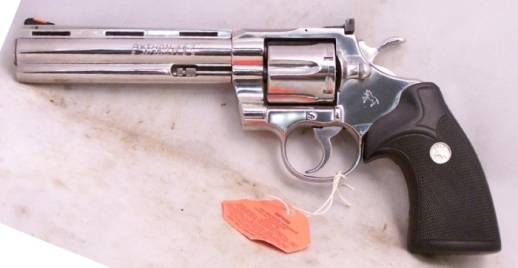
Python Hunter.
1981.
This was an eight inch barrel model in a fitted Halliburton aluminum case, and fitted with a Leupold 2X scope.
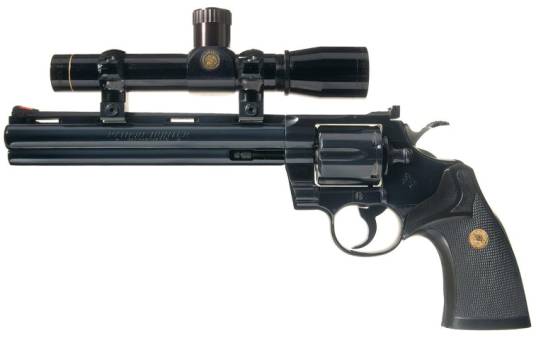
Python Silhouette.
1983.
This was an eight inch barreled model with the "Silhouette" name on the barrel, fitted with a Leupold 2X scope fitted farther to the rear,
and cased in a black luggage type case.
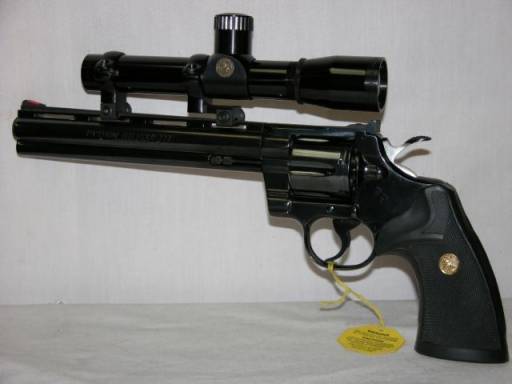
Python Target.
This was an 8 inch blued or bright nickel Python chambered in .38 Special. There were 3,489 in Royal Blue, and only 251 in bright nickel.
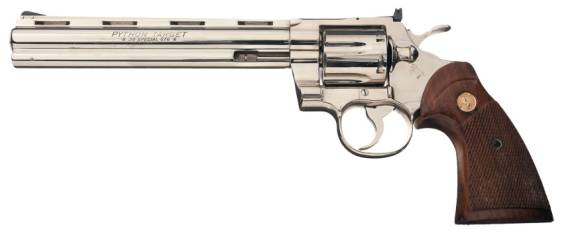
Python Ten Pointer.
This was an eight inch barreled Python with a 3X Burris scope, walnut grips, an extra set of rubber grips, and a carrying case.
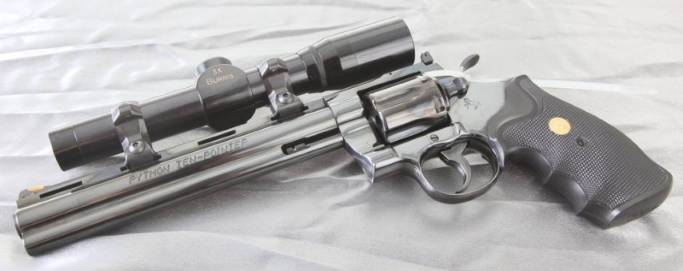
COLT STALKER
1988
Came with a black nylon flapped hunter type shoulder holster with a large Colt emblem on the flap.
Colt says they made 200 in 1988.
This is somewhat a mystery model at this time. Guns are reported with a variety of scopes, mostly Leupold, sometimes with no scope.
This model is not listed in any of Colt's lists of factory models, so it's possible it was made for some other company who finished them.
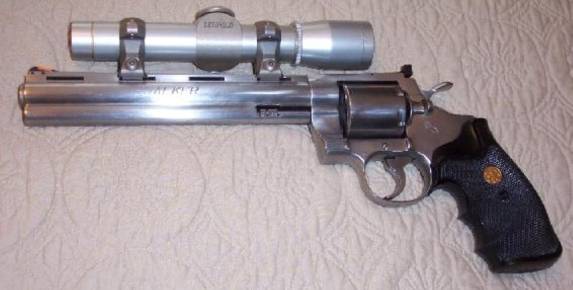
CALIFORNIA COMBAT PYTHON
These were sold exclusively by West Coast Distributor Pacific International
Apparently Colt supplied them with 8 inch .38 Special Pythons, which they had shortened by a local source and re-chambered to .357.
Unlike a factory Python, the front sights were not pinned in the barrel ramp.
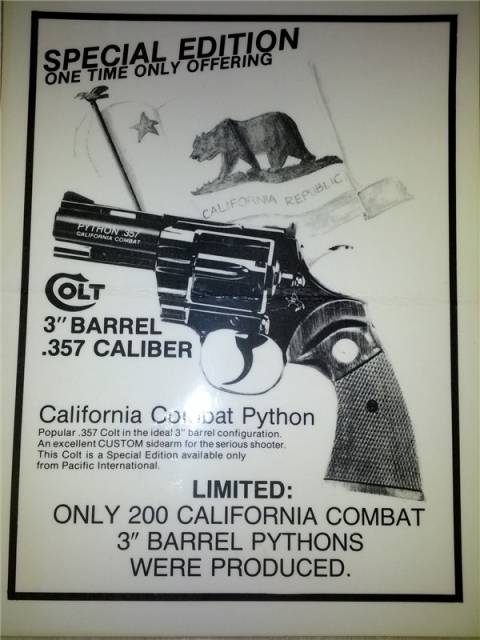
COMMEMORATIVE MODELS
Colt also produced a number of factory commemorative models of the Python. Most of these Commemorative or Special Edition guns had special serial numbers.
The Bicentennial Set. 1976. 1777 made.
This was a set composed of a Single Action Army, a black powder Colt Third Model Dragoon, and a Python. The set was highly engraved and came in a walnut display case.
Python Silver Snake Special Edition. 1983. 250 made.
A six inch, stainless steel Python with a black chrome plated finish, Pachmayr rubber grips with Custom Shop pewter medallions, etched engraving, and a custom gun pouch.
Colt Double Diamond Set. 1986.
A stainless steel Ultimate polish six inch Python and an Officer's Model ACP .45, smooth rosewood grips, presentation cased.
Snake Eyes Limited Edition. 1989,
A pair of Pythons with 2 1/2 inch barrels, one in Royal Blue the other in bright polish stainless steel. Ivory "Service" type grips scrimshawed with "snake eyes" dice on the left side and a royal flush poker hand on the right side. The set included poker chips and playing cards.
FACTORY SPECIAL EDITIONS
These were factory engraved models, usually cased. Since these were often offered for sale by the organization ordering them, these are considered to be "public" editions.
King Ranch Python. 1981. 100 made.
This was a six inch blued model, gold inlaid with "D" factory level engraving, Rosewood grips, in a walnut case.
Canadian Province Python. 1979.
A six inch blue, with ivory grips.
St. Paul Police Department Python. 1980. 200 made.
A bright nickel Python.
Minneapolis Police Department Python. 1981. 200 made
A six inch blue.
Durham County Python. 1981. 250 made.
A six inch bright nickel.
BATF (Bureau of Alcohol, Tobacco, and Firearms) Python. 1982. 25 made.
A four inch, blued.
Florida Highway Patrol Python. 1983. 100 made.
A six inch, bright nickel.
Florida Marine Patrol Python. 1983. 100 made.
A six inch, blued.
Florida Game and Fish Python. 1983. 100 made.
A six inch, bright nickel.
Sheriff Buford Pusser Python. 1983. 50 made.
A four inch, blued, ivory grips.
Colorado State Patrol Python. 1983. 235 made.
A six inch, blued.
Since factory records are not available beyond 1986, it's possible there are other special editions not listed here.
NON-COLT COMMERATIVES AND PRIVATE EDITIONS
There are any number of non-Colt commemorative Pythons issued by other companies. Colt will sell standard production firearms to outside companies and large firearms distributors who then have the guns embellished by custom gunsmithing companies. Among the companies known to issue these non-Colt commemoratives are "America Remembers", and big gun distributors like Lew Horton and Talo Distributors.
Since these guns are not usually engraved or decorated by Colt, these guns are not considered to be Colt factory commemoratives, and an archive letter may show them as standard production guns.
Since these are not Colt commemoratives, it can be difficult to find out any details on who actually sold them.
One of the most famous of the non-Colt Pythons is the "California Combat" Python. These were originally eight inch barreled Pythons shipped to a West coast distributor who had the barrels cut off to three inches and a non-pinned front sight installed. The barrel was marked with non factory style lettering.
Another type of Colt factory commemorative that's not listed in normal factory lists are Private Edition models.
Colt has always offered custom firearms from the factory for individual buyers, but they also offer custom editions if the buyer is willing to purchase at least 25 guns.
These private editions are not listed on normal lists of Colt commemoratives due to the fact that they were sold to private individuals or organizations, and they were considered to be a private matter.
Among the private editions were guns bought by wealthy individuals wanting to present friends with a special gift, businesses wanting special awards for employees, fraternal organizations, and police organizations wanting a pistol to commemorate a department anniversary.
Since these private edition guns were a private matter, how many were made and who bought them is unknown to the public.
Due to the lack of knowledge, it can be difficult to determine if an engraved and decorated Python is a non-Colt commemorative, or a private edition model. Usually, a private edition will show as a factory gun in an Archive letter and will list the custom features.
GRIPS
The grips, or stocks used on the Python changed more than anything else over the years.
It's near impossible to say with certainty exactly when Colt stopped using one type and started using another.
The dates shown here that Colt changed from one style of Python grip to another are estimates only.
Colt catalogs might show an older style that had been replaced a year before, and Colt may have used older styles until the supply was exhausted even though the type had "officially" changed.
It's becoming more and more common to see Pythons on which the wrong type of grips are mounted. With the price of genuine Colt grips skyrocketing, it's very common for owners to switch grips and use them on another Colt or sell them at great profit.
Trying to determine exactly what type of grips a Python left the factory with is often impossible to say for sure, especially around the times when Colt was in the process of changing the style.
Colt almost always used American walnut grips on their firearms. These grips were cut from planks, not blocks, so the grain will not match and there may be slight color variations between the two halves.
Colt used blued steel grip screws and a single steel grip screw bushing on the right hand grip. On nickel guns the bushing and screw may be nickel plated.
COLT GRIP MEDALLIONS
Up until 1955, all Colt's had Silver medallions in the walnut grips. Since the Python was to be a special gun, it was decided to give it Gold Colt medallions to separate it from "ordinary" Colt's.
From 1955 to around the later 1970's the Python was fitted with Gold medallions and all other Colt's with Silver.
With Colt it's impossible to say "never", and it's possible a few Pythons mistakenly left the factory with Silver medallions, but the Python-only Gold medallions was a standard Colt usually followed closely.
Starting sometime in the later 1970's Gold medallions started appearing on other Colt pistols, and by the mid-1980's all Colt's had Gold Medallions.
Then in the mid-1990's Silver started being occasionally seen on some Pythons, usually stainless steel models with rubber grips.
CUSTOM SHOP GRIPS
Over the years, Colt offered any number of custom grips, usually on special order through the Custom Shop.
These could be special ordered on a Python or could be bought for owner installation on a Python.
Custom Shop grips were almost always made of better quality woods, including Rosewood. They often had Custom Shop medallions, but also were sold with standard Gold medallions.
Custom Shop grips were invariably very close copies of whatever style of grip Colt was using at the time, usually Second or Third Types.
Custom Shop grips were made in the USA first, then contracted to suppliers in India then Italy. The grips were available in versions with or without checkering, but always in fancier woods and very close to factory shape.
It was not unusual for owners to sand the checkering off standard production grips. Altered grips can usually be identified by the plain, standard grain of the walnut.
PRODUCTION GRIPS
FIRST TYPE.
Used from 1955 to about 1961.
Fully checkered, with a dull, non-gloss oil finish.
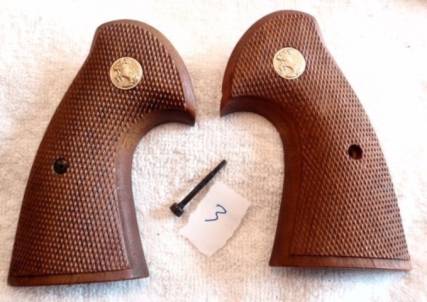
SECOND TYPE
Used from about 1961 to the early 1970's.
Note the "thumb rest", actually a loading clearance cut, only on the left side, and the semi-circular checkering border under the medallions. The checkering pattern is on a raised area that stands up above the surrounding wood.
All grips from this point on were finished with a semi-gloss combined stain and finish.
These are often thought to be the most attractive of the Colt Target grips.
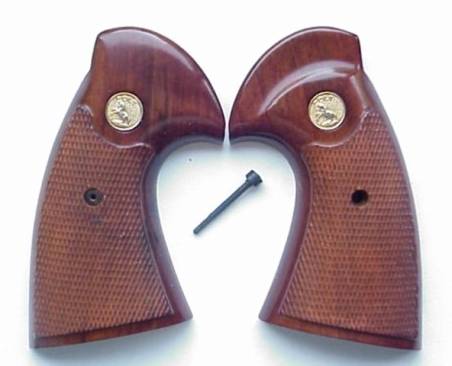
THIRD TYPE
Used from early 1970's to the early 1990's
Note the "thumb rest" is now on both sides, and the checkering border is in a slanted straight line under the medallions.
In the late 1980's the color of the American Walnut began to get lighter and lighter with less figure in the grain.
The color began to change to an odd orange-like color then to an almost blond color.
Also in the late 1980's the use of a tan colored patching material was used to repair small surface defects in the wood and to correct poor fit inside.
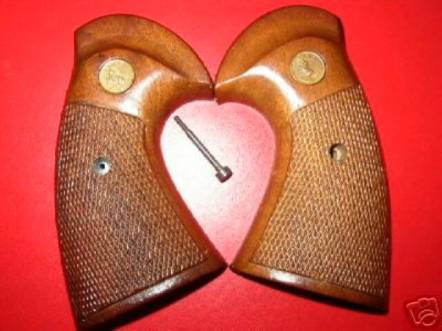
PYTHON SERVICE TYPE
Used on the 2 1/2" Python.
These Service type grips were used on the 2 1/2" barreled Python as standard. While these may be seen on longer barreled models, the Service type would have normally been used on a longer barreled Python only as a special order.
In most cases, Service grips on longer barreled models are the result of an owner switching them for the Target grips.
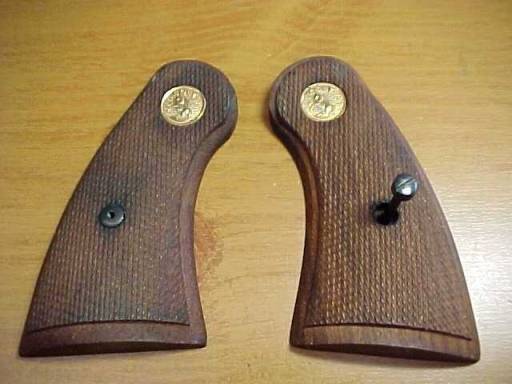
FOURTH TYPE
Used from the late 1990's to the end of production in 2003-2004, usually on the Python Elite.
These grips are made of laminated wood and came in several colors and with Gold or Silver medallions.
These were made under the "Excalibur" name by a contractor for Colt and were most commonly used on the Python Elite. These were not checkered.
This grip is the only Colt Target grip still available from Colt.
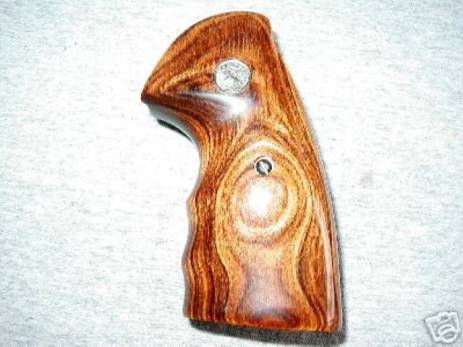
PACHMAYR "PRESENTATION" RUBBER
Used on many stainless Pythons and sold by Colt as an aftermarket accessory from the late 1970's.
In the 1990's, some blued Pythons may have shipped with rubber grips.
There were two versions of these, the first was slightly larger, the second smaller and with slightly rounded off edges on the bottom.
Pictured is a pair of the second, slightly smaller type. These were standard on mid-1990's 6 and 8 inch models.
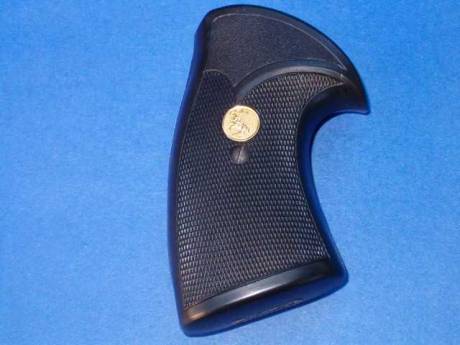
PACHMAYR "GRIPPER" RUBBER
Used from the mid-1980's.
Colt used the Gripper rubber grip on some stainless Pythons and also sold it as an aftermarket item. These were standard on mid-1990's 4 inch stainless models.
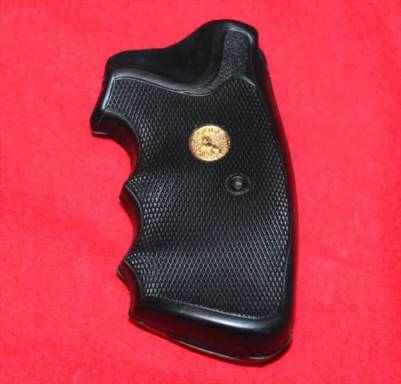
HOGUE MONO-GRIP RUBBER
Used for a short time in the mid-1990's on the four inch Python.
These Hogue grips had a Colt logo molded into the right side, and were only used for a short time.
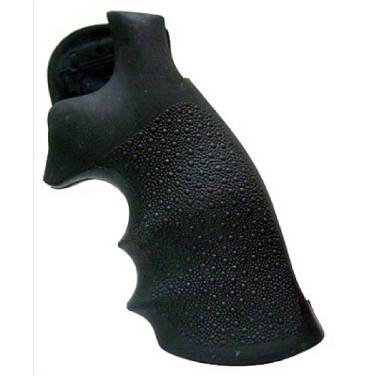
FAKES AND REPLICAS
With the prices of genuine Python grips soaring, fakes and "replicas" have begun to flood the market.
It's common to see Pythons with these fake grips, often described as "Colt factory" or deliberately leaving the impression they're factory grips.
Fakes are often recognized by the use of brass screws and brass bushings on BOTH sides of the grips.
Other common features are highly figured foreign woods, mis-shapen loading clearance cuts, poorly done checkering, or grips that are flatter then the oval shaped Colt factory grips.
ITALIAN MADE FAKES
These were one of the first fake types available and may even be found in fake Colt packaging.
The wood is a European walnut, and the screw and bushings are brass. These grips are much flatter then the oval Colt grips. Note the odd Smith & Wesson type checkering pattern with the grooved border.
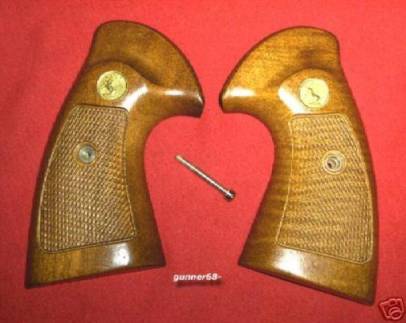
ITALIAN FAKE
Made by the same maker as the above Italian grips, these are made of a cheap hardwood with a walnut stain finish. No Colt medallions and steel bushings.
These were sold at one time for as little as $9.95.
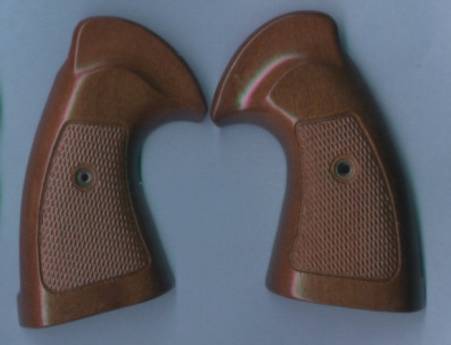
ASIAN FAKES.
A good many fakes are now being made in Asia. While these are sometimes closer to the shape of real Colt grips, the wood and checkering is still noticeably different. These are usually flatter near the top than the well-rounded Colt factory grips.
The medallions look like real Colt until you look close.
ASIAN SECOND TYPE
A replica of the Colt Second Type Target grip. Note how flat they are above the medallions.
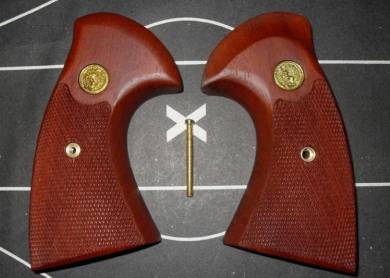
ASIAN THIRD TYPE, DIFFERENT MAKER
The medallions on these are out and out counterfeits of Colt factory.
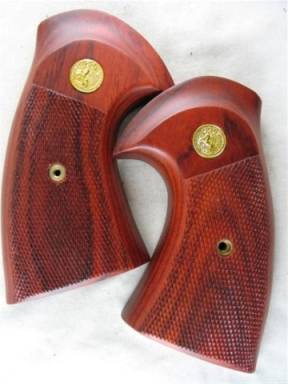
THIRD TYPE FAKE MADE IN INDIA
Note the garish figured wood and the crude checkering common to Indian replicas. Loader cuts are only vaguely shaped.
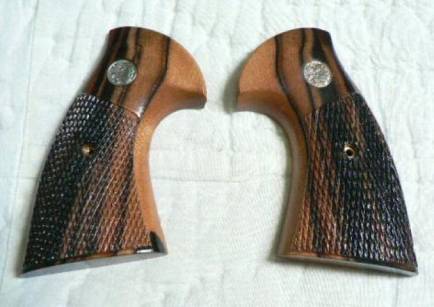
There are some replica Colt grips that are almost exact copies of genuine Colt and use Colt factory type medallions. These usually have much fancier grained wood and a high gloss finish.
These are most often sold by Gungrip.com
FAMOUS PYTHONS AND OWNERS
As the finest double action revolver, the Python was seen as a status symbol and many famous people owned Pythons or gave them as gifts.
Among them:
Elvis Presley owned a number of Pythons and gave Pythons as gifts.
Sheriff Buford Pusser, made famous in several movies carried a four inch blued Python.
The 2 1/2 inch Python was a status symbol among FBI agents, especially Washington headquarters staff agents, and many carried one up until ordered to switch to the S&W 10mm automatic.
So identified was the 2 1/2" Python with the FBI, in the 1960's and 70's TV show "The FBI" actor Efrem Zimbalist, Jr carried one.
FBI Director J, Edgar Hoover owned a four inch blued Python.
Actor Steve McQueen owned at least one six inch blued Python.
Famed Army Special Forces Colonel Arthur D. "Bull" Simons owned a Colt Python and carried it on the famous Son Tay rescue attempt into North Vietnam.
Simons was reported to have shot several enemy soldiers with the Python.
Other Special Forces personnel owned Pythons and carried them into battle in Southeast Asia, with reportedly great effect on enemy soldiers.
The Colt Python, often profusely engraved and inlaid with precious metal was a favorite of Texas Ranger Captains and individual Rangers.
The Texas Ranger museum at Waco has a number of famous Rangers Colt Pythons on display.
In his book "Arson" by John Barracato, the author tells about a New York Fire Department arson inspector in the bad days of the 1960's when many buildings in the Bronx were being burned for insurance.
Often having dangerous encounters with arsonists, the Inspector had one particularly bad episode in a dark, abandoned building late one night. The suspects were not at all impressed by the Fireman’s two inch .38 revolver, so next morning he went to the famed John Jovino gun store in New York and asked for "The biggest, baddest, meanest looking gun they had".
The salesman wordlessly reached into the counter and pulled out a bright nickel Colt Python. The inspector said that no one ever again failed to be impressed with his new Colt when he drew it.
The Florida Highway Patrol carried bright nickel Colt Pythons. Prior to the Pythons they carried special order bright nickel, five inch barreled Colt 357 Model revolvers.
After the invasion and liberation of Kuwait, the Emir ordered four inch Colt Pythons and Mercedes cars to re-equip his police force.
King Hussein of Jordan ordered a number of Colt Pythons with four and six inch barrels as gifts for friends. Most were given to kings and presidents in the middle East. These Pythons were engraved and had the Royal Seal of the King inlaid in gold on the barrel.
The Python has appeared in a great many Hollywood movies and television shows. One director stated that in the 1960's and 70's the Colt Python was chosen whenever a visually impressive pistol was wanted.
The Python made a number of famous appearances in Hollywood productions, among them:
In the Clint Eastwood "Dirty Harry" series movie "Magnum Force" motorcycle policemen used 4 inch blued Pythons. Like the S&W .44 Magnum before it, this caused a brief run on Colt Pythons in the gun shops.
In the iconic TV show "Starsky and Hutch" actor David Soul carried a six inch blued Python.
In the movie "Electra-glide in Blue" an ambitious motorcycle cop played by Robert Blake carried a Colt blued Python with a custom bright nickel barrel and cylinder.
These types of multi-finish guns are often known as "pintos".
In the Steve McQueen movie "The Getaway", actor Al Lettieri uses a 6 inch Python until the final scenes of the movie, when in a error the Python mysteriously changes to a six inch Colt Trooper Mark III.
In the 1980's Colt conducted a hunt on a Texas game ranch for gun magazine writers and several famous shooters.
Famed American champion target pistol shooter Bill Blankenship, known as "The Human Machine Rest", killed his deer with one shot at a range of 150 yards with a four inch Colt Python.
American gun writer, firearms expert, martial artist, part time police officer, and Expert Witness in many court trials, Massod Ayoob often used a Colt Python to win combat shooting matches and often wrote about the Python.
The American Practical Police Course (PPC) is a pistol match for police officers. In the early days, the Colt Python was a favorite due to the heavier barrel and increased accuracy.
Many police were armed with the S&W revolver for duty and preferred the S&W trigger action, so custom gunsmiths began fitting Python barrels to S&W revolvers for the matches.
These became known and "Smythons" or "Smolts".
In the late 1960's, Colt firearms were extremely difficult to get because Colt was heavily committed to producing arms for the Vietnam War.
With Pythons largely unavailable but for some reason barrels easily had, some custom gunsmiths began fitting Python barrels to the still readily available Colt Trooper revolver.
The front of the frame where it was contoured to match the round Trooper barrel was heli-arc welded up to mate with the top rib of the Python barrel and the new barrel was installed.
The action was tuned to Python levels and the gun was re-blued with a Python quality bright polish blue job.
Many subsequent owners of these converted "Pooper" or "Troop-on" Colt's are unaware these are not Pythons, and often the only indication of the conversion is a slight discoloration of the bluing on the top of the frame where it was welded up.